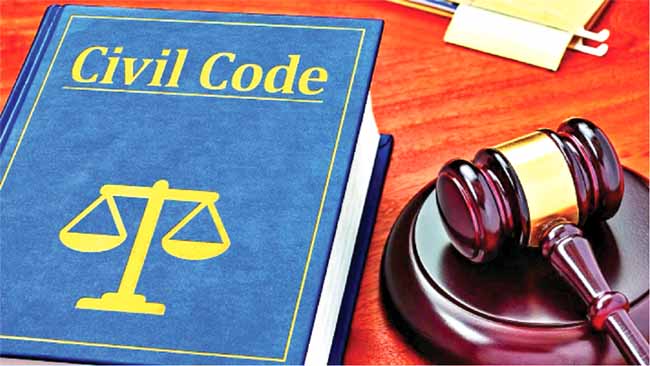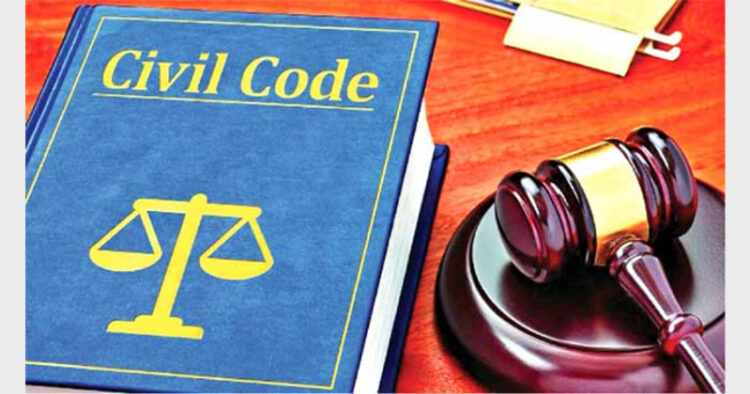
Uniform application of our Constitution, by effacing an artificially engineered coup on the Constitution – Article 35A – was perhaps the greatest tribute the nation paid to the legacy of Babasaheb Dr Ambedkar. Article 35A, inserted into the Constitution by an executive fiat was a blemish on the Constitution.
The very same forces that opposed the application of our Constitution to J&K through Article 35A are behind the sinister scheme to ensure that Dr. Ambedkar’s yet another vision – Article 35 – envisioning Uniform Civil Code (UCC)—is not implemented either in letter or in spirit.
Babasaheb was a great votary of UCC. He saw it as a fundamental edifice of our constitutional scheme. Deliberations of the Constituent Assembly, particularly those held on November 23, 1948, documenting Babasaheb’s strong espousal of UCC, are a great testimony to his unflinching commitment for unity and integrity of the nation through the constitutional instrument of UCC.
Babasaheb Quashes
Dr Ambedkar dispelled three prominent amendments or oppositions that were raised against Article 35.
The first and the most common and prominent opposition to UCC was that a vast nation with great diversity cannot be encapsulated into one code. Dr. Ambedkar clearly elucidated that for several decades preceding the draft Constitution, we had uniform code of laws covering almost every aspect of human relationship. Dr. Ambedkar rightly pointed out that all prominent pre-constitutional legislation that governed our legal rights—Indian Penal Code, 1860, Indian Contract Act 1872, Negotiable Instruments Act, 1881 and Transfer of Property Act, 1882—occupied almost the entire province our legal rights and obligations. He quipped his opponents by asking when all these laws are operative throughout the country across several decades, across all communities, what is the difficulty with implementation of UCC. Babasaheb was of the view that except ‘only province the Civil Law has not been able to invade so far is Marriage and Succession’ while all other legislation were commonly in operation across the nation. Dr Ambedkar vehemently said that “It is too late now to ask the question whether we could have a Uniform Civil Code”.
The second argument advanced against the Code was that Muslim personal law, throughout the country, was immutable and uniform throughout the nation. Dr. Ambedkar quashes this untenable contention by stating that until 1937 Muslims across many of the provinces – North-West Frontier Province, United Provinces, Central Provinces and Bombay—were regulated by the Hindu Law in the matters of succession. Dr. Ambedkar also pointed out that Marumakkathayam Law, a matriarchal law, governed the Hindus and Muslims alike in North Malabar region (today’s north Kerala).
These are the exact words of Dr. Ambedkar on how UCC is not anathemic to the Muslim interests: “Therefore if it was found necessary that for the purpose of evolving a single civil code applicable to all citizens irrespective of their religion, certain portions of the Hindus law, not because they were contained in Hindu law but because they were found to be the most suitable, were incorporated into the new civil code projected by article 35, I am quite certain that it would not be open to any Muslim to say that the framers of the civil code had done great violence to the sentiments of the Muslim community.”
When we have given unto ourselves the Constitution—the mother documentation, that is at the edifice of every legislation – evolving UCC is a logical legal sequel. When we are governed by a common law on property—both movable and immovable—its indeed travesty that inheritance of that property is regulated by different laws. It is with this profound understanding of the constitutional jurisprudence, Dr. Ambedkar, the great constitutionalist, espoused UCC.
It is difficult to conceive how the Fundamental Rights in Part 3 of the Constitution can be equitably and uniformly implemented without having a uniform code regulating our personal rights. As Babasaheb had succinctly pointed out, UCC is inseparably interwoven to our legislative and constitutional scheme. As long as there is no UCC the other fundamental and constitutional rights are but functionally inadequate.
Restore Constitution’s glory
In a recent ruling (Jose Paulo Coutinho vs. Maria Luiza Valentina Pereira) delivered on September 13, 2019, in which the Apex Court reminded the legislature of UCC, the Supreme Court considered the question “Whether succession to the property of a Goan, situated outside Goa in India, will be governed by the Portuguese Civil Code, 1867 as applicable in the State of Goa or the Indian succession Act, 1925”
The Court has clearly documented that the Portuguese Civil Code, a law of Portuguese origin, became applicable to the domiciles of Goa by an act our Parliament and is now a part of our national law. If our legislature can have no qualms in having UCC for Goa by conferring an imperialist the status of our national legislation, what can possibly prevent it enacting our own UCC?

Apex Court askes when Muslim men whose marriages registered in Goa cannot practice polygamy and there is no provision for verbal divorce, exceptions should be carved out in other parts within the same nation. In fact, this is precisely what Babasaheb asked slightly differently, precisely seventy-one years ago in the Constituent Assembly while giving finishing touches to our Constitution.
Successive governments have not only insinuated the Constitution and its chief architect but also have disregarded Apex Court’s numerous reminders right from Shah Bano’s case. Forget implementing UCC, the then Congress Government led by Rajiv Gandhi in fact, caused violence on the Constitution by enacting the Muslim Women (Protection of Rights on Divorce) Act, 1986, that nullified the impact of Supreme Court’s judgment. If this is not a violence on the Constitution then nothing can be.
Present Government has momentous opportunity to undo the crimes on the Constitution perpetrated over the ages and to reinstate Dr Ambedkar, and the document that he so passionately architected, into their glorious magnificence.
(The writer is a Bengaluru-based lawer)














Comments